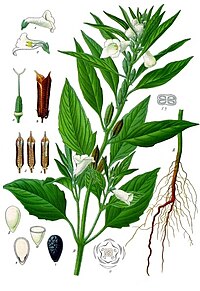
Photo from wikipedia
Sesame (Sesamum indicum, L.) seed oil was characterized for quality characteristics, phenolic composition and was supplemented to rabbits in different doses to assess potential beneficial effects. The phenolic profile of… Click to show full abstract
Sesame (Sesamum indicum, L.) seed oil was characterized for quality characteristics, phenolic composition and was supplemented to rabbits in different doses to assess potential beneficial effects. The phenolic profile of the oil was studied using reversed phase HPLC-DAD method. Sesame oil was rich in total phenolic contents, flavonoids, pigments and possess strong antioxidant activity. The HPLC-DAD results showed 16 polyphenolic compounds in sesame seed oil. Rosmarinic acid hexoside (12.6 μg/g), 3-coumaroylquinic acid (11.3 μg/g), hydroxybenzoic acid (7.74 μg/g), quercetin-3,4-diglucoside-(6-feruloyl glucoside) (5.25 μg/g) and ellagic acid pentoside (4.98 μg/g) were the major phenolic compounds. Sesame oil supplementation significantly improved the body weight of the rabbits without affecting the vital organs. Significant improvement was also observed in serum lipids in a dose dependent manner, while no significant effects were documented in hematological and liver histological parameters. These results indicate that supplementation of SO was beneficial owing to the presence of high levels of important polyphenolic compounds and can be used as a good functional food supplement.
Journal Title: Journal of Food Measurement and Characterization
Year Published: 2017
Link to full text (if available)
Share on Social Media: Sign Up to like & get
recommendations!